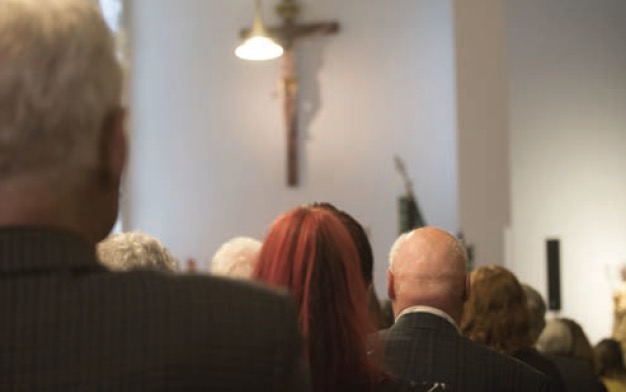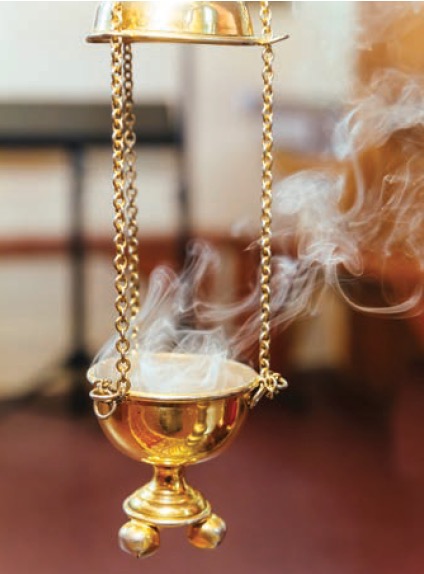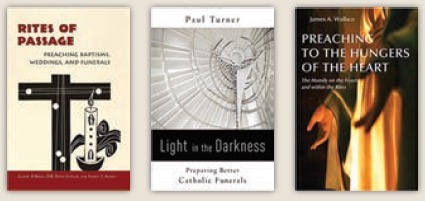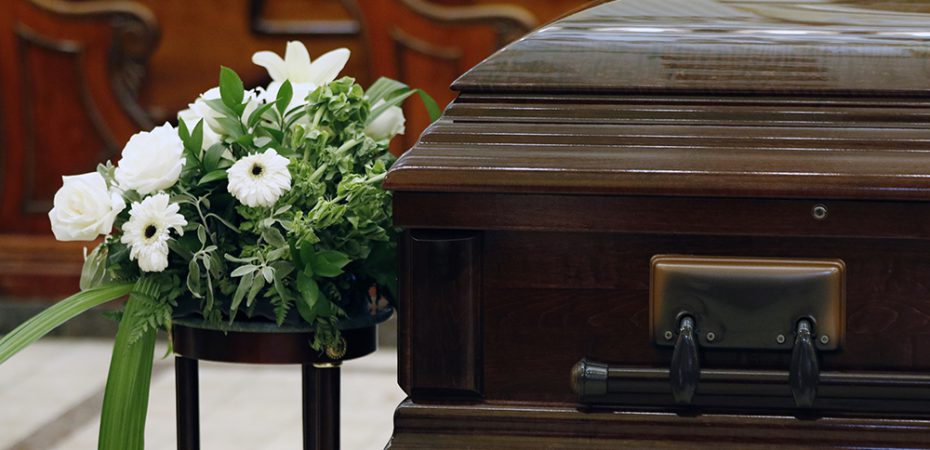The Funeral Homily
Deacon Frank Agnoli 1
Preaching at the funeral rites can seem daunting. Time is short, and we may not even know the deceased or the bereaved. Emotions often run high. Increasingly, those who gather for a funeral are either indifferent or even hostile to the Christian story. We may be uncomfortable with grief, including our own. There are more than 31,000 possible combinations of readings, not to mention all the options for prayer texts. Yet, we are called to proclaim God’s compassionate love, provide strength and consolation to the bereaved, and nourish their hope (cf. Order of Christian Funerals, No. 27). How might we do so?

We preach who we are. Our history of grief and loss will affect our funeral preaching. Old wounds may be reopened by the specifics of a given funeral. Any unresolved or unacknowledged grief may make us less able to minister effectively to mourners, and might even result in the inflicting of our own unhealed wounds on those in the assembly. Our preaching reflects our theology, whether explicitly and carefully explored or implicit and unexamined. How we approach the questions of God and suffering (theodicy), God’s action in the world (providence), and death and final things (eschatology), will come across in what we say or choose not to say. We must take the time to understand carefully, appropriate and be challenged by the Church’s wisdom in this regard, and to ensure that our preaching is consonant with that wisdom.
Know the Wider Context
Healthy grief involves attending to the present loss and looking back with gratitude, so as to be able to look forward with hope and meaning. As we meet with the bereaved shortly after a death, the initial reactions of shock or numbness, disbelief or denial, are usually evident. Feelings are raw. Eventually, this gives way to storytelling, to remembering the loved one. Over time, long after the funeral is over, integration of the loss becomes the focus. The Order of Christian Funerals mirrors this path.
The Order of Christian Funerals presumes three major rites — the vigil, the funeral liturgy, and the rite of committal — separated by processions and minor rites (cf. No. 43). Like a biblical lament, the Order of Christian Funerals leads worshippers in naming their present loss, remembering the past and looking to the future with hope. While all three elements are present in each rite, each also has its own emphasis. The vigil helps mourners express their sorrow (No. 52). The funeral first turns their attention to the past, on praise and thanksgiving for God’s great deeds, and then begins to shift the focus to the future in the rite of commendation (No. 129). This stress on future hope in the face of death continues in the rite of committal (Nos. 206, 209).
Know the Specific Context
The preacher’s first task is to be a story-listener. Author Robert Hughes, in “A Trumpet in the Darkness” (Augsburg Fortress Publishing, $47.25), describes funeral preaching as the weaving together of three stories: God’s, the mourners’ and the deceased’s. We listen to stories about the life and death of the one who has died. Sudden or violent deaths raise different questions than does a peaceful death at the end of a long and fruitful life, or the death that comes after prolonged suffering. And we also listen to the mourners’ stories.
Communities that gather for funerals are quite diverse. Some embrace a deep Christian faith, others another faith or no faith at all; some are questioning or seeking. Finally, by attending to the readings and other texts, we become aware of “God’s story.” The Scriptures proclaim the Paschal Mystery, teach us to remember the dead, and encourage hope (cf. No. 22). The wide selection of readings and prayers allows the preacher to choose texts that best reflect the particularity and the pastoral needs of the community in question. (See sidebar below for some strategies for listening.)
Put It Together

The lives of the deceased and bereaved reveal the Paschal Mystery, much in the same way that the lenses in a pair of glasses work. Without the lenses, the glasses are useless. Likewise, a funeral homily that does not attend to the particular stories of the deceased and the bereaved risks becoming impersonal, abstract and irrelevant. However, if we focus only on the lenses themselves, on the deceased (as in a eulogy; cf. No. 27) or the bereaved (reducing the homily to grief therapy), then the One we ought to be focused on — Christ — becomes distorted; and so does our preaching. A thoughtful funeral homily, envisioned as an act of pastoral care, attends to all three stories.
In speaking of the deceased, we must speak truthfully (including the manner of death if helpful), while refraining from airing confidential details about the deceased or the family. In speaking of the mourners, we must acknowledge the range of emotions they are feeling, the questions they are asking and the stories they are telling — but not claim that they are our own.
The stories of the deceased and the bereaved are the context in which we retell the story of God’s abiding care for us. In doing so, we need to be especially careful. In desiring to offer hope, we may be tempted to “preach” the deceased into heaven, give details about the next life or try to explain “God’s will” in a particular (especially tragic) situation. We cannot claim to know what only God knows. The language we use to speak of these mysteries is neither the language of surety nor the language of doubt but the language of hope and trust in the promises of God; not the language of merit but the language of grace; it is metaphorical, not literal.
DEACON FRANK AGNOLI, M.D., D.Min., ordained for the Diocese of Lexington, Kentucky, currently serves as the director of liturgy and director of deacon formation for the Diocese of Davenport, Iowa.
……………………………………………………………………………………………………………………………………………….
Questions for the homilist
The Preacher:
• Does this funeral remind you of any of your losses? How might your ministry to the bereaved, and especially your preaching, be affected?
• Does this funeral raise any particular theological questions for you? How have you wrestled with those questions in the past? Any new insights?
The Deceased:
• What do you know about their story, including the death itself?
• When you listen to the story, what do you hear about creativity? About relationships with the critical people in his/her story? What experiences of the true, good and beautiful stand out? What do you hear about his or her attitude and approach to unavoidable suffering? What did the deceased believe about life and death?
• What key images, words and/or metaphors do you hear?
The Mourners:
• Who was with the deceased at the time of death, or found the body? Have they raised any particular questions or concerns?
• Who are the bereaved (friends, family, co-workers, parishioners)? Why are they at the funeral? In what ways are they vulnerable? What feeling(s) predominates? What questions are being asked? What is not being mentioned? Who is being left out or not allowed to mourn? What do they believe?
The Liturgy and Homily:
• How do the readings, music and prayers work together?
• In what liturgical season is this funeral being celebrated? How might that inform the homily?
• What Good News do people need to hear? What would help them in their grief?
• How do the three stories — God’s, the deceased’s, the mourners’ — intersect?
• How will I name the present loss and acknowledge the death truthfully? How will I remember the past (with gratitude)? How will I point toward hope in the future?
……………………………………………………………………………………………………………………………………………….
Recommended Books

“Rites of Passage: Preaching Baptisms, Weddings, and Funerals” by Father Guerric DeBona, OSB, Father David Scotchie, and Deacon Francis L. Agnoli. Liturgical Press, $29.95
“Light in the Darkness: Preparing Better Catholic Funerals” by Father Paul Turner, Liturgical Press, $19.95
“Preaching to the Hungers of the Heart: The Homily in the Feasts and within the Rites,” by James A. Wallace, Liturgical Press, $24.95






Comments are closed.